

Cla.umn. Rethinking the Decline of China's Qing Dynasty: Imperial Activism and ... - Daniel McMahon. Fall of China's Qing Dynasty: Causes and Consequences. When China's Qing Dynasty fell in 1911-1912, it marked the end of the nation's incredibly long imperial history.

That history stretched back at least as far as 221 BCE when Qin Shi Huangdi first united China into a single empire. During much of that time, China was the single, undisputed superpower in East Asia, with neighboring lands such as Korea, Vietnam, and an often-reluctant Japan trailing in its cultural wake. After more than 2,000 years, though, Chinese imperial power was about to collapse for good. Macartney and the Emperor. Reading for Students: Macartney and the Emperor Many Europeans had contact with China over the centuries.
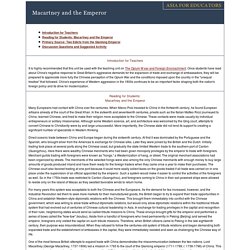
The way we were: Western visitors to China. Extracts from memoirs and diaries by Ian Irvine / June 19, 2013 / Leave a commentPublished in July 2013 issue of Prospect Magazine George Macartney refuses to bow before Emperor Qianlong in 1792 © The Art Archive/ Eileen Tweedy Matteo Ricci was an Italian Jesuit missionary who travelled to China in 1583.
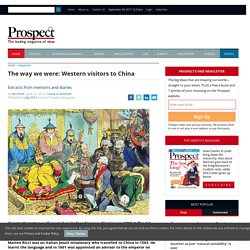
He learnt the language and in 1601 was appointed an advisor to the emperor on account of his knowledge of astronomy. He died in Beijing in 1610. World History Blog: Letter of Advice to Queen Victoria. Letter of Advice to Queen Victoria.
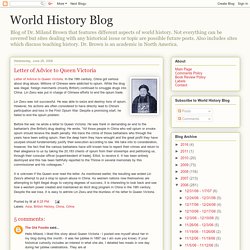
In the 19th century, China got serious about drug abuse. Millions of Chinese were addicted to opium. While the drug was illegal, foreign merchants (mostly British) continued to smuggle drugs into China. Primary Source 13.0 Lin. Hello adblock user... The webserver at Alpha History tells us you’re using an adblocking tool, plug-in or browser extension on your computer or network.

We understand that many people don’t like web-based advertising. Ads on websites can often be irrelevant, distracting and ‘in your face’. Without ads, however, our website would not exist – or it would not be free. Ads are how we fund the creation and delivery of our content. We love providing free textbook-quality content and resources to people like you. If you would like to use our website and its resources, please disable your adblocker or whitelist our website. British Imperialism in China. By Tao He The primary motive of British imperialism in China in the nineteenth century was economic.
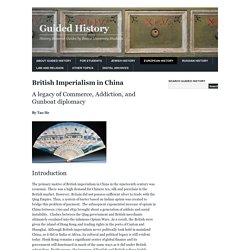
There was a high demand for Chinese tea, silk and porcelain in the British market. However, Britain did not possess sufficient silver to trade with the Qing Empire. Thus, a system of barter based on Indian opium was created to bridge this problem of payment. Sentinelese - Wikipedia. The Sentinelese (also called the Sentineli or North Sentinel Islanders) are the indigenous people of North Sentinel Island in the Andaman Islands of India.
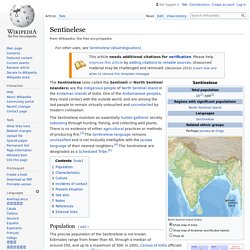
One of the Andamanese peoples, they resist contact with the outside world, and are among the last people to remain virtually untouched and uncontacted by modern civilisation. Population[edit] The New Imperialism. 1.
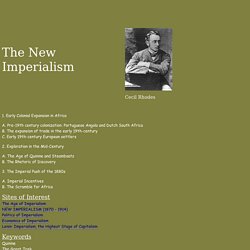
Early Colonial Expansion in Africa A. Pre-19th century colonization: Portuguese Angola and Dutch South Africa B. The expansion of trade in the early 19th-century C. Early 19th-century European settlers 2. A. The Age of Imperialism. During the late nineteenth and early twentieth centuries, the United States pursued an aggressive policy of expansionism, extending its political and economic influence around the globe.
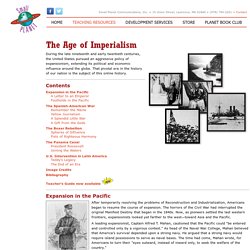
That pivotal era in the history of our nation is the subject of this online history. Expansion in the Pacific A Letter to an Emperor. Napoleonic Propaganda At The British Museum. Unit 5 Curriculum. BBC Empire Episode 1: A Taste for Power. Colonialism's Impact on Africa. Introduction: What is Imperialism? “Your father’s lightsaber.
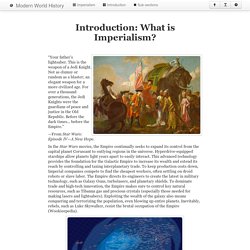
This is the weapon of a Jedi Knight. Not as clumsy or random as a blaster; an elegant weapon for a more civilized age. For over a thousand generations, the Jedi Knights were the guardians of peace and justice in the Old Republic. Before the dark times... before the Empire.” —From Star Wars: Episode IV—A New Hope. China in Africa: The New Imperialists? It happened in Zambia like it could happen elsewhere in Africa. Chinese investors made deals with the government to mine its natural resources, filling federal coffers with billions of dollars. Chinese immigrants moved into cities and rural towns. They started construction companies; opened copper, coal, and gem mines; and built hotels and restaurants, all providing new jobs. They set up schools and hospitals. But then instances of corruption, labor abuse, and criminal coverups began to set the relationship between the Chinese and the Africans aflame.
The Legacy of New Imperialism In China. Chinese textbooks in the 21st century teach school children about the sense of gouchi, or national humiliation, in the 19th century: from the Taiping Rebellion to the Opium Wars to losing the war with Japan to the Boxer rebellion. The legacy of foreign imperialism continued into the 20th century.
As late as the 1930s, ten percent of the population—50 million people—were still addicted to opium (Lovell 324). British control of one port city lasted 150 years. The British refused to return the colony of Hong Kong—seized during the First Opium War—to China until 1997. We’re Still Fighting the Opium Wars. The 19th century Opium Wars between England and China had lasting ramifications for both countries—so much so that in some ways the wars never ended. The politics of victimization are a potent force in the world today. In the U.S., the dredge of cable news seems to be a daily battle between conservatives and liberals over who has been most victimized by the cruelty of the opposing side.
On the global stage, debates about climate change or humanitarian intervention often devolve into debates about designs of Western powers versus the victims of Western imperialism. Few play the victim—at home or abroad—better than China. And almost no event plays a larger role in that identity as a victim than the Opium Wars. Julia Lovell’s The Opium War: Drugs, Dreams, and the Making of Modern China tackles this relatively small war that has had such an outsized historical impact. 1750-1919: China and the West: Imperialism, Opium, and Self-Strengthening (1800-1921) A Chinese Christian on the Boxer Rebellion (1900) Chinese Revolution documents. A Chinese historical view of the Boxer Rebellion (1976)
A Prisoner of the Boxer Rebellion, 1900. A Prisoner of the Boxer Rebellion, 1900 Trouble had been brewing in China for years. Foreign exploitation by various countries had escalated to the point that the outright partitioning of China into international zones seemed likely. This aroused a violent movement among the Chinese to rid their country of foreign influence. Nanjing. Internet History Sourcebooks. Fei Ch'i-hao was a Chinese Christian. China__The_Open_Door_Policy.asf. Boxer Rebellion - Facts & Summary. BBC Empire - Episode 4 Making a Fortune Jeremy Paxman. Role Play differing perspectives Imperialism China. USF's WebQuest. Empire's Opium Trade - Empire - Episode 4 - BBC One. The Age of Imperialism: A Unit Plan. Reading 20 2. TheAgeofImperialism. Foreign imperialism in China. Macartney and the Emperor.
The Opium War and Foreign Encroachment. Reading for Students: The Opium War and Foreign Encroachment. Primary Sources with Document-based Questions. • Macartney and the Emperor The Qing dynasty's restrictions on foreign trade increasingly frustrated Europeans, especially the British. In 1792 Great Britain sent a diplomat, Lord George Macartney (1737-1806), to present its demands to the Qianlong emperor (r. 1736-1796).
This unit includes an introductory note to teachers with suggestions for teaching about Macartney's mission; a student reading discussing European contact and trade with China prior to and on the eve of Macartney's mission to China; and the primary-source reading Two Edicts from the Qianlong Emperor, which were the Qianlong emperor's responses to the Macartney mission. With discussion questions and suggested activities for students. Yanfu learning west. The Opium War - Lost in Compensation l HISTORY OF CHINA. The Boxer Rebellion l HISTORY OF CHINA. Asian Responses to Imperialism: Crash Course World History #213. British Imperialism in China.